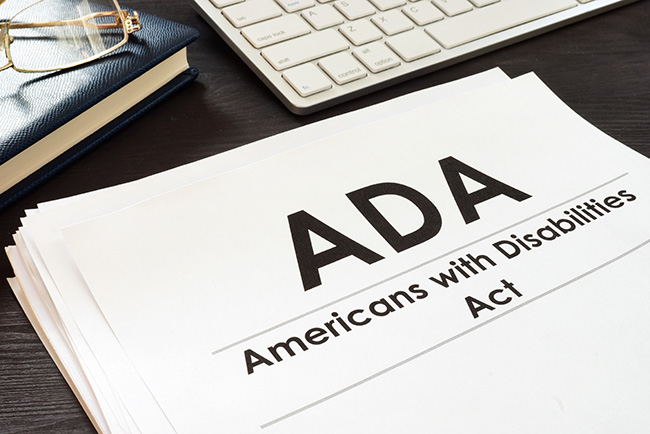All websites should be ADA compliant. Although the Americans with Disabilities Act Standards for Accessible Design only requires that websites of certain businesses must be accessible to people with disabilities—vision and hearing impaired, and those who must navigate by voice, screen readers, or other assistive technologies—nearly every business falls into one of the categories specified:
- State and local government agencies
- Private employers with 15 or more employees
- Companies operating for the public’s benefit
- Places of public accommodation
While your business may not directly fall into one of these categories, your website might fall under Title III of the ADA, which has been interpreted to include websites as places of public accommodation. Website accessibility lawsuits against companies by plaintiffs claiming that they cannot access websites because they are incompatible with assistive technologies are becoming more common and often cite Title III violations.
To protect your business from a potential lawsuit for ADA violations, and to protect your brand and reputation, there are steps you need to take to ensure your website is ADA compliant: perform an accessibility audit and fix any issues that make your site non-compliant.
Step 1: Perform an Accessibility Audit of Your Website
A website accessibility audit is an evaluation of how accessible your content is for all users. A thorough assessment will look at your website and digital content, as well as any mobile apps and internal-facing intranets. Common problems and barriers to accessibility are related to four principles including how perceivable, operable, understandable, and robust your content is for users and assistive technologies. The Web Content Accessibility Guidelines (WCAG) include a list of seventy-eight items to measure against your site.
Manual Accessibility Audit
One approach to assessing your website accessibility is to perform a manual audit, whereby you review all aspects of your content against the WCAG guidelines and test content compatibility with keyboards and assistive devices, such as screen readers. As you would expect, this can be a labor-intensive undertaking.

Automated Accessibility Audit
Automated accessibility testing tools can be employed to quickly scan your website content and code for WCAG compliance errors. A simple Google search of “automated accessibility testing tools” will bring up a number of online tools and resources for testing your website’s accessibility. The advantage of automated testing is speed and efficiency. The drawback is that automated testing typically only catches 30-40% of accessibility issues as outlined by the WCAG.
Whether manual or automated, a website accessibility audit should assess the following:
- Page structure and navigation
- Readability and color contrast
- Internal and external links
- Alt text and anchor texts
- PDF accessibility
- Buttons
- HTML and CSS
The best approach is a dual approach that relies on both a manual and automated accessibility audit.
Step 2: Follow the WCAG
Meeting the standards outlined in the WCAG will improve the accessibility of your website for individuals with vision or hearing impairments, or those with cognitive, language, or learning disabilities, and will ensure ADA compliance is not an issue for your website.
There are other benefits to having an ADA-compliant website, besides protection from possible lawsuits. The more your site adheres to the WCAG, the more assurance you have that users can easily navigate your site, which also increases the likelihood of users converting into customers. Additionally, improving your website’s ADA compliance will improve your SEO. An ADA-compliant site is easier for search engines to crawl and index, which will push it up in search result rankings.
Ensuring your website and digital content are ADA compliant does not need to be a burdensome task for your business. Employing the use of software and online tools to perform an accessibility audit can help. Working with an expert in website design and development to fix all the identified issues can close the gap between non-compliance and compliance. Working with a digital agency that specializes in audits—accessibility, SEO, and conversion rates—will cover all your bases.
Fuze7 Digital Marketing has been helping businesses in a wide range of industries improve their online presence, increase website traffic and raise conversion rates, for over 9 years. Contact us today when you need make your site ADA compliant or would like an Audit of your online reputation to help grow your business online.








